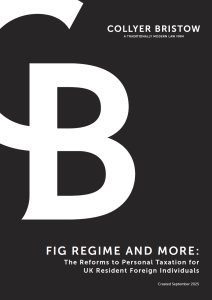
The Team
Our lawyers have the expertise and experience to provide you with creative, personalised solutions in a clear and understandable way.
Our Publications
Discover a wealth of invaluable guidance in the form of guides and brochures written by our expert lawyers.
Our insights
Discover the latest insights and thought leadership from our team of legal experts.
About
What are the grounds for contesting a will?
There are several possible reasons for challenging a will.
- The will has not been properly executed
A will must be signed and witnessed according to strict rules to be valid and it is not unusual for DIY willmakers to get this wrong. However, unless there’s an obvious error, the Court will presume that the will has been validly executed – even if the will is handwritten or (in certain circumstances)signed with a thumbprint. You will require strong evidence to challenge a will on the grounds of lack of due execution.
- The willmaker did not have the mental capacity to make a will
A person must have the appropriate level of mental capacity to make a will, which includes knowing the consequences of making the will and the approximate value of the estate they are leaving behind. The question of whether the willmaker was of sound mind is generally one of fact and determined by medical evidence. Mental capacity generally will be presumed if the person left a will which appears to be rational.
- The willmaker was coerced into making the will (Undue Influence)
Coercion has a broad definition. It may take the form of physical threats, psychological manipulation, or the exploitation of a position of trust. If it can be shown that the willmaker was subjected to coercive behaviour and this led them to make decisions which they would not have otherwise made, then the will could be declared invalid.
- The willmaker did not know and approve the contents of the will
If any suspicious details surround how the will was created — for instance, if one of the main beneficiaries had a substantial role in writing the will or setting up it, or the will is written in a language which is not the testator’s first language — then this may impede on its validity. The court will seek to determine whether the deceased actually knew and agreed to what is written inside their will.
- The will has been altered or forged
Fraud and forgery cases are rare when contesting a will because there is a higher burden of proof with criminal actions, and one party to the fraud (the deceased) is not able to give evidence. You will need the strongest evidence to contest a will on these grounds, which may include the evidence of a handwriting expert to determine whether the signature of the person who made the will is genuine.
- The will did not reflect the deceased’s wishes (Rectification)
If the will does not reflect the true wishes of the deceased, there may be a claim for the will to be rectified. This can be where the solicitor who drafted the will didn’t understand the willmaker’s intentions or made a clerical error when the will was drawn up. Virtually all claims for rectification involve a negligent act by the solicitor who drafted the will. Depending on your circumstances, your solicitor may recommend that you pursue a professional negligence claim as well as, or instead of, a claim for rectification.
How long do I have to contest a will?
The time limit for making a claim depends on the ground you are claiming on. Rectification claims, for example, have to be brought within six months of the Grant of Probate being issued. If you believe there are adequate grounds to challenge the validity of a will, then you should seek professional legal advice as soon as possible after the death. If appropriate, your solicitor can enter a caveat with the Probate Registry to prevent a Grant of Probate being taken out while the claim is investigated.
How much does it cost to contest a will and who pays?
The cost of contesting a will can vary significantly depending on the complexity of your case and the tactics used by the solicitors involved. Litigation is the most expensive part of a claim and the legal spend could easily be tens of thousands of pounds if a case proceeds to trial. Resolving matters through mediation allows the claim to be settled at a lower cost.
The usual position in contentious probate cases is that the loser pays the winner’s costs; however, this is a matter for the Court to decide. The Court may order the estate to pay the costs or that each party bears their own costs. If the parties settle the claim at any stage, then costs will be part of the negotiations that take place.
What happens when you contest a will?
Before challenging the validity of a will, it is important to understand the implications of doing so. If you are successful and the will is declared invalid, then an earlier, valid will could be admitted to probate in its place. If there is no such valid will, then the deceased’s estate will be distributed according to the intestacy rules.
Either way, the deceased’s estate will be divided up differently. You will need to be sure that your claim is justified and that the outcome will be better for you under these alternative scenarios.
How we can help
If you’re looking to contest a will, or you’re defending a claim from another person, our team can help. We have a wealth of experience in challenging and defending wills and our specialist solicitors are adept at understanding the complexities that can arise. We offer a free initial consultation to discuss your potential claim, so please get in touch with us to find out how we can help.
Spotlight
Challenging a will
Where a will does not accurately reflect the deceased’s wishes, or where there are question marks over how a will was made, we advise clients as to the available options to challenge the will. Circumstances may include an invalidly executed will, fraud or forgery, undue influence, and the testator lacking the requisite testamentary capacity to make a will. We can act in bringing or defending challenges of this type.
Spotlight
Claiming under the Inheritance Act 1975
Certain categories of person can make a claim under the Inheritance (Provision for Family and Dependants) Act 1975 to seek an order for reasonable financial provision from a person’s estate when they have not been left anything under the will. We have experience of acting for both claimants and defendants in these cases.
Spotlight
Disputes with trustees
Beneficiaries sometimes feel that trustees are not complying or fulfilling their duties properly. Such disagreements range from the inadequate provision of information to more fundamental negligence and breach of trust claims. We act for both trustees and beneficiaries in resolving these disputes when they arise.
Spotlight
Wills for business owners
We advise clients who own businesses on how best to structure their will so as to make use of business property relief in passing assets down to future generations. A will trust to hold business assets is often flexible and tax-efficient, whether the intention is that the business continues to be owned and run by the family, or the business will be sold.
Quick glance: publications
- FIG Regime and more: The Reforms to Personal Taxation for UK Resident Foreign IndividualsWhat the new rules mean for UK resident foreign taxpayers - What the new rules mean for UK resident foreign taxpayers
- Planning with crypto assets
- Private Wealth services
- Lifetime Giving | Trusts and School FeesA guide to tax efficient arrangements - A guide to tax efficient arrangements
- Inheritance Act Claims:An overview - An overview
- A Question of Capacity
Contesting a will Publications
FIG Regime and more: The Reforms to Personal Taxation for UK Resident Foreign IndividualsWhat the new rules mean for UK resident foreign taxpayers - What the new rules mean for UK resident foreign taxpayers
From 6 April 2025, UK tax for foreign residents is based solely on tax residence, not domicile. The simplified system affects income, capital gains, and inheritance tax, offering some residents up to four years to shelter non-UK income and gains.
Planning with crypto assets
It is increasingly important for individuals to understand how crypto assets are taxed, both in life and on death, and ensure the consideration of crypto assets in succession planning.
Private Wealth services
An overview of our Private Wealth services for individuals and families based in the UK and overseas.
Lifetime Giving | Trusts and School FeesA guide to tax efficient arrangements - A guide to tax efficient arrangements
Many families contend with paying school fees running into hundreds of thousands of pounds per child over the course of their education. This guide examines some tax efficient arrangements that other family members (typically grandparents) can use to contribute to these costs.
Inheritance Act Claims:An overview - An overview
If a deceased’s Will fails to make adequate provision for someone who falls within certain categories, the Inheritance Act 1975 may permit them to successfully claim part of the deceased’s estate. This guide explains more.
A Question of Capacity
This guide, A Question of Capacity, outlines key points for consideration to ensure business owners put their businesses in the best position possible in the event of your incapacity.
Contesting a will insights
Podcasts
UK Tax Audits and Investigations: How to Deal with HMRC with James Austen and Henry LopesUK Tax Audits and Investigations: How to Deal with HMRC with James Austen and Henry Lopes
Listen now
Podcasts
The Role of Financial Coaching in Family Disputes with Kristin CunliffeThe Role of Financial Coaching in Family Disputes with Kristin Cunliffe
Listen now
News
Government Introduces ‘Mansion Tax’ Surcharge on Properties Over £2mGovernment Introduces ‘Mansion Tax’ Surcharge on Properties Over £2m
Read more
Podcasts
The Anson Case and How the UK Really Taxes LLCs with James Austen and Henry LopesThe Anson Case and How the UK Really Taxes LLCs with James Austen and Henry Lopes
Listen now
Shorter Reads
IHT on UK farming land and buildings held through offshore companiesIHT on UK farming land and buildings held through offshore companies
Read more
Shorter Reads
HMRC Loan Schemes: A New Settlement Approach for Individuals Caught Up in Disguised Remuneration (Autumn Budget 2025)HMRC Loan Schemes: A New Settlement Approach for Individuals Caught Up in Disguised Remuneration (Autumn Budget 2025)
Read more
Podcasts
Common Law Marriage: What Cohabiting Couples Need to KnowCommon Law Marriage: What Cohabiting Couples Need to Know
Listen now
Podcasts
Investing for Children in the US UK Space with Patrick MulhernInvesting for Children in the US UK Space with Patrick Mulhern
Listen now
Shorter Reads
Renters’ Rights Bill: Key Considerations for Landlords Looking to Sell or Regain PossessionRenters’ Rights Bill: Key Considerations for Landlords Looking to Sell or Regain Possession
Read more
Podcasts
Episode 1: Introducing LawTorn – Exploring Family and Inheritance DisputesEpisode 1: Introducing LawTorn – Exploring Family and Inheritance Disputes
Listen now
Longer Reads
Why early estate planning is key to effective generational wealth transferWhy early estate planning is key to effective generational wealth transfer
Read more
Podcasts
Living in America as a Brit: Opportunities, Pitfalls & Planning First with Richard TaylorLiving in America as a Brit: Opportunities, Pitfalls & Planning First with Richard Taylor
Listen now
You might also like
Need some more information? Make an enquiry below
Contesting a will key contacts
- Samara
DuttonPartner
Talk to Samara about Trusts & Inheritance disputes and Private wealth
Contesting a will
Before challenging the validity of a will, it is important to understand the implications of doing so. If you’re looking to contest a will, or you’re defending a claim from another person, our team can help. We have a wealth of experience in challenging and defending wills and our specialist solicitors are adept at understanding the complexities that can arise. We offer a free initial consultation to discuss your potential claim, so please get in touch with us to find out how we can help.
The Team
Our lawyers have the expertise and experience to provide you with creative, personalised solutions in a clear and understandable way.
Our Publications
Discover a wealth of invaluable guidance in the form of guides and brochures written by our expert lawyers.
Our insights
Discover the latest insights and thought leadership from our team of legal experts.
What are the grounds for contesting a will?
There are several possible reasons for challenging a will.
- The will has not been properly executed
A will must be signed and witnessed according to strict rules to be valid and it is not unusual for DIY willmakers to get this wrong. However, unless there’s an obvious error, the Court will presume that the will has been validly executed – even if the will is handwritten or (in certain circumstances)signed with a thumbprint. You will require strong evidence to challenge a will on the grounds of lack of due execution.
- The willmaker did not have the mental capacity to make a will
A person must have the appropriate level of mental capacity to make a will, which includes knowing the consequences of making the will and the approximate value of the estate they are leaving behind. The question of whether the willmaker was of sound mind is generally one of fact and determined by medical evidence. Mental capacity generally will be presumed if the person left a will which appears to be rational.
- The willmaker was coerced into making the will (Undue Influence)
Coercion has a broad definition. It may take the form of physical threats, psychological manipulation, or the exploitation of a position of trust. If it can be shown that the willmaker was subjected to coercive behaviour and this led them to make decisions which they would not have otherwise made, then the will could be declared invalid.
- The willmaker did not know and approve the contents of the will
If any suspicious details surround how the will was created — for instance, if one of the main beneficiaries had a substantial role in writing the will or setting up it, or the will is written in a language which is not the testator’s first language — then this may impede on its validity. The court will seek to determine whether the deceased actually knew and agreed to what is written inside their will.
- The will has been altered or forged
Fraud and forgery cases are rare when contesting a will because there is a higher burden of proof with criminal actions, and one party to the fraud (the deceased) is not able to give evidence. You will need the strongest evidence to contest a will on these grounds, which may include the evidence of a handwriting expert to determine whether the signature of the person who made the will is genuine.
- The will did not reflect the deceased’s wishes (Rectification)
If the will does not reflect the true wishes of the deceased, there may be a claim for the will to be rectified. This can be where the solicitor who drafted the will didn’t understand the willmaker’s intentions or made a clerical error when the will was drawn up. Virtually all claims for rectification involve a negligent act by the solicitor who drafted the will. Depending on your circumstances, your solicitor may recommend that you pursue a professional negligence claim as well as, or instead of, a claim for rectification.
How long do I have to contest a will?
The time limit for making a claim depends on the ground you are claiming on. Rectification claims, for example, have to be brought within six months of the Grant of Probate being issued. If you believe there are adequate grounds to challenge the validity of a will, then you should seek professional legal advice as soon as possible after the death. If appropriate, your solicitor can enter a caveat with the Probate Registry to prevent a Grant of Probate being taken out while the claim is investigated.
How much does it cost to contest a will and who pays?
The cost of contesting a will can vary significantly depending on the complexity of your case and the tactics used by the solicitors involved. Litigation is the most expensive part of a claim and the legal spend could easily be tens of thousands of pounds if a case proceeds to trial. Resolving matters through mediation allows the claim to be settled at a lower cost.
The usual position in contentious probate cases is that the loser pays the winner’s costs; however, this is a matter for the Court to decide. The Court may order the estate to pay the costs or that each party bears their own costs. If the parties settle the claim at any stage, then costs will be part of the negotiations that take place.
What happens when you contest a will?
Before challenging the validity of a will, it is important to understand the implications of doing so. If you are successful and the will is declared invalid, then an earlier, valid will could be admitted to probate in its place. If there is no such valid will, then the deceased’s estate will be distributed according to the intestacy rules.
Either way, the deceased’s estate will be divided up differently. You will need to be sure that your claim is justified and that the outcome will be better for you under these alternative scenarios.
How we can help
If you’re looking to contest a will, or you’re defending a claim from another person, our team can help. We have a wealth of experience in challenging and defending wills and our specialist solicitors are adept at understanding the complexities that can arise. We offer a free initial consultation to discuss your potential claim, so please get in touch with us to find out how we can help.
Samara DuttonPartner
View Samara Dutton's profileCameron CreesAssociate
View Cameron Crees's profileCarly RussellPartner
View Carly Russell's profileCharlie FowlerPartner
View Charlie Fowler's profileEmily MalvasoSenior Associate
View Emily Malvaso's profileSPOTLIGHT
Challenging a willopen
Where a will does not accurately reflect the deceased’s wishes, or where there are question marks over how a will was made, we advise clients as to the available options to challenge the will. Circumstances may include an invalidly executed will, fraud or forgery, undue influence, and the testator lacking the requisite testamentary capacity to make a will. We can act in bringing or defending challenges of this type.
Claiming under the Inheritance Act 1975open
Certain categories of person can make a claim under the Inheritance (Provision for Family and Dependants) Act 1975 to seek an order for reasonable financial provision from a person’s estate when they have not been left anything under the will. We have experience of acting for both claimants and defendants in these cases.
Disputes with trusteesopen
Beneficiaries sometimes feel that trustees are not complying or fulfilling their duties properly. Such disagreements range from the inadequate provision of information to more fundamental negligence and breach of trust claims. We act for both trustees and beneficiaries in resolving these disputes when they arise.
Wills for business ownersopen
We advise clients who own businesses on how best to structure their will so as to make use of business property relief in passing assets down to future generations. A will trust to hold business assets is often flexible and tax-efficient, whether the intention is that the business continues to be owned and run by the family, or the business will be sold.
Contesting a will Publications
- FIG Regime and more: The Reforms to Personal Taxation for UK Resident Foreign IndividualsWhat the new rules mean for UK resident foreign taxpayers - What the new rules mean for UK resident foreign taxpayers
- Planning with crypto assets
- Private Wealth services
- Lifetime Giving | Trusts and School FeesA guide to tax efficient arrangements - A guide to tax efficient arrangements
- Inheritance Act Claims:An overview - An overview
- A Question of Capacity
Contesting a will insights
Podcasts
UK Tax Audits and Investigations: How to Deal with HMRC with James Austen and Henry LopesUK Tax Audits and Investigations: How to Deal with HMRC with James Austen and Henry Lopes
Listen now
Podcasts
The Role of Financial Coaching in Family Disputes with Kristin CunliffeThe Role of Financial Coaching in Family Disputes with Kristin Cunliffe
Listen now
News
Government Introduces ‘Mansion Tax’ Surcharge on Properties Over £2mGovernment Introduces ‘Mansion Tax’ Surcharge on Properties Over £2m
Read more
Podcasts
The Anson Case and How the UK Really Taxes LLCs with James Austen and Henry LopesThe Anson Case and How the UK Really Taxes LLCs with James Austen and Henry Lopes
Listen now
Shorter Reads
IHT on UK farming land and buildings held through offshore companiesIHT on UK farming land and buildings held through offshore companies
Read more
Shorter Reads
HMRC Loan Schemes: A New Settlement Approach for Individuals Caught Up in Disguised Remuneration (Autumn Budget 2025)HMRC Loan Schemes: A New Settlement Approach for Individuals Caught Up in Disguised Remuneration (Autumn Budget 2025)
Read more
Podcasts
Common Law Marriage: What Cohabiting Couples Need to KnowCommon Law Marriage: What Cohabiting Couples Need to Know
Listen now
Podcasts
Investing for Children in the US UK Space with Patrick MulhernInvesting for Children in the US UK Space with Patrick Mulhern
Listen now
Shorter Reads
Renters’ Rights Bill: Key Considerations for Landlords Looking to Sell or Regain PossessionRenters’ Rights Bill: Key Considerations for Landlords Looking to Sell or Regain Possession
Read more
Podcasts
Episode 1: Introducing LawTorn – Exploring Family and Inheritance DisputesEpisode 1: Introducing LawTorn – Exploring Family and Inheritance Disputes
Listen now
Longer Reads
Why early estate planning is key to effective generational wealth transferWhy early estate planning is key to effective generational wealth transfer
Read more
Podcasts
Living in America as a Brit: Opportunities, Pitfalls & Planning First with Richard TaylorLiving in America as a Brit: Opportunities, Pitfalls & Planning First with Richard Taylor
Listen now
Need some more information? Make an enquiry below.
Message us on WhatsApp (calling not available)
Please note that Collyer Bristow provides this service during office hours for general information and enquiries only and that no legal or other professional advice will be provided over the WhatsApp platform. Please also note that if you choose to use this platform your personal data is likely to be processed outside the UK and EEA, including in the US. Appropriate legal or other professional opinion should be taken before taking or omitting to take any action in respect of any specific problem. Collyer Bristow LLP accepts no liability for any loss or damage which may arise from reliance on information provided. All information will be deleted immediately upon completion of a conversation.
Close






























